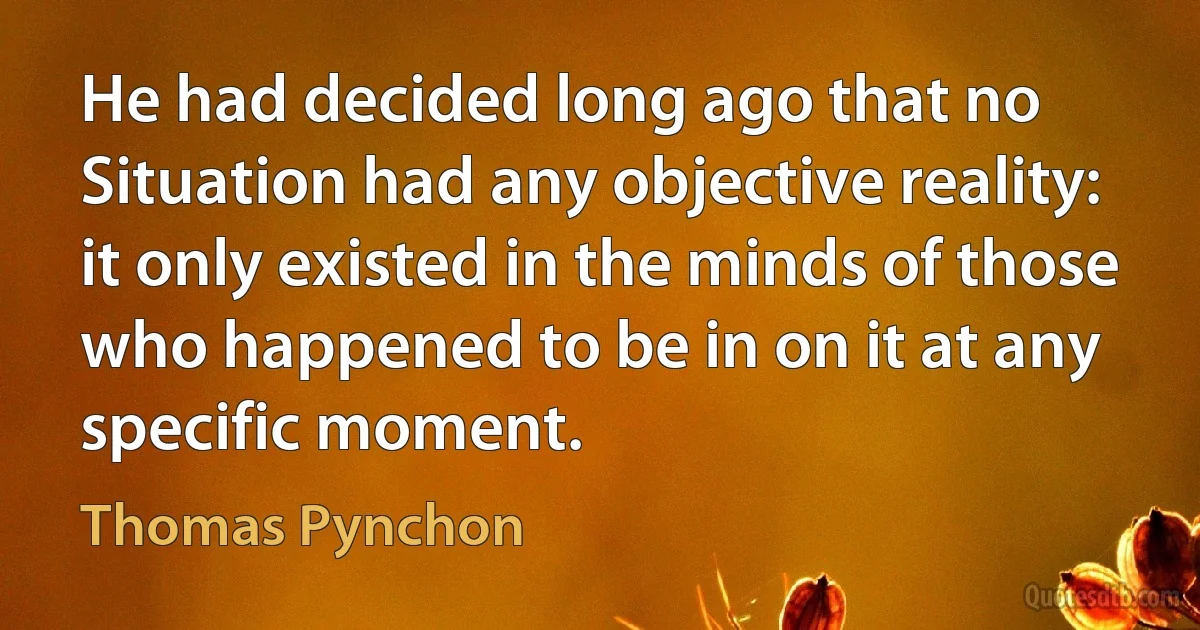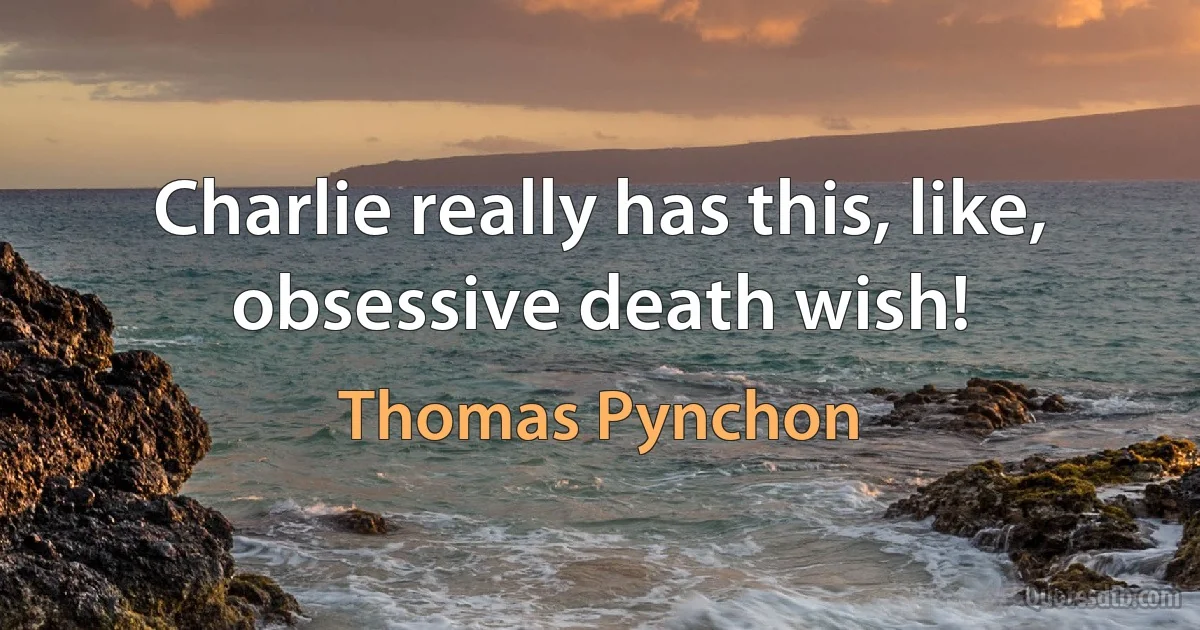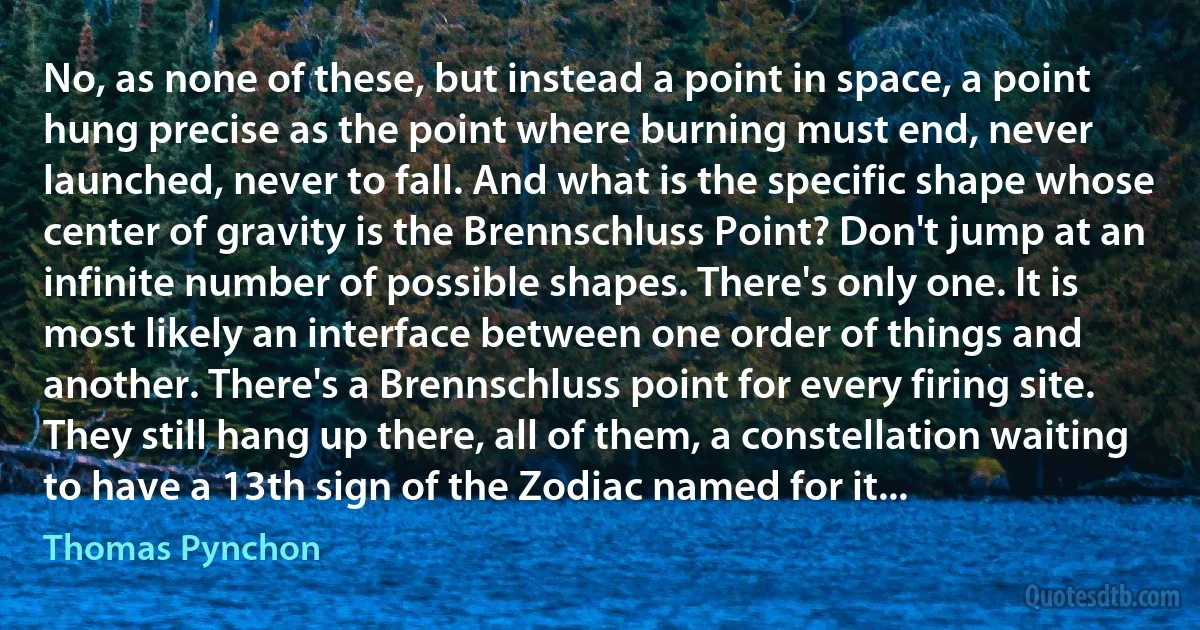Thomas Pynchon quotes - page 6
At Bishop they learn'd that Dixon had been buried in back of the Quaker Meeting-House in Staindrop. Doctor Isaac stay'd with his Father, step for step. At the grave, which by Quaker custom was unmark'd, Mason beseech'd what dismally little he knew of God, to help Dixon through. The grass was long and beaded with earlier rain. A Cat emerg'd from it and star'd for a long time, appearing to know them.
"Dad?" Doc had taken his arm. For an instant, unexpectedly, Mason saw the little Boy who, having worried about Storms at Sea, as Beasts in the Forest, came running each time to make sure his father had return'd safely, - whose gift of ministering to others Mason was never able to see, let alone accept, in his blind grieving, his queasiness of Soul before a life and a death, his refusal to touch the Baby, tho' 'twas not possible to blame him.... The Boy he had gone to the other side of the Globe to avoid was looking at him now with nothing in his face but concern for his Father.
"Oh, Son."

Thomas Pynchon
In the eighteenth century it was often convenient to regard man as a clockwork automaton. In the nineteenth century, with Newtonian physics pretty well assimilated and a lot of work in thermodynamics going on, man was looked on as a heat engine, about 40 per cent efficient. Now in the twentieth century, with nuclear and subatomic physics a going thing, man had become something which absorbs X-rays, gamma rays and neutrons.

Thomas Pynchon
Who claims Truth, Truth abandons. History is hir'd, or coerc'd, only in Interests that must ever prove base. She is too innocent, to be left within the reach of anyone in Power,- who need but touch her, and all her Credit is in the instant vanish'd, as if it had never been. She needs rather to be tended lovingly and honorably by fabulists and counterfeiters, Ballad-Mongers and Cranks of ev'ry Radius, Masters of Disguise to provide her the Costume, Toilette, and Bearing, and Speech nimble enough to keep her beyond the Desires, or even the Curiosity, of Government.

Thomas Pynchon
Perhaps history this century, thought Eigenvalue, is rippled with gathers in its fabric such that if we are situated, as Stencil seemed to be, at the bottom of a fold, it's impossible to determine warp, woof, or pattern anywhere else. By virtue, however, of existing in one gather it is assumed there are others, compartmented off into sinuous cycles each of which had come to assume greater importance than the weave itself and destroy any continuity. Thus it is that we are charmed by the funny-looking automobiles of the '30's, the curious fashions of the '20's, the particular moral habits of our grandparents. We produce and attend musical comedies about them and are conned into a false memory, a phony nostalgia about what they were. We are accordingly lost to any sense of continuous tradition. Perhaps if we lived on a crest, things would be different. We could at least see.

Thomas Pynchon
There'd been no escape. What did she so desire to escape from? Such a captive maiden, having plenty of time to think, soon realizes that her tower, its height and architecture, are like her ego only incidental: and what really keeps her where she is is magic, anonymous and malignant, visited upon her from outside and for no reason at all. Having no apparatus except gut fear and female cunning to examine this formless magic, to understand how it works, how to measure its field strength, count its lines of force, she may fall back on superstition, or take up a useful hobby like embroidery, or go mad, or marry a disc jockey. If the tower is everywhere and the knight of deliverance no proof against its magic, what else?

Thomas Pynchon
Out at the horizon, out near the burnished edge of the world, who are these visitors standing... these robed figures - perhaps, at this distance, hundreds of miles tall - their faces, serene, unattached, like the Buddha's, bending over the sea, impassive, indeed, as the Angel that stood over Lübeck during the Palm Sunday raid, come that day neither to destroy nor to protect, but to bear witness to a game of seduction... What have the watchmen of the world's edge come tonight to look for? Deepening on now, monumental beings stoical, on toward slag, toward ash the colour the night will stabilize at, tonight... what is there grandiose enough to witness?

Thomas Pynchon
This ascent will be betrayed to Gravity. But the Rocket engine, the deep cry of combustion that jars the soul, promises escape. The victim, in bondage to falling, rises on a promise, a prophecy, of Escape....
Moving now toward the kind of light where at last the apple is apple-colored. The knife cuts through the apple like a knife cutting an apple. Everything is where it is, no clearer than usual, but certainly more present. So much has to be left behind now, so quickly.

Thomas Pynchon
It went on for a month. Those who had taken it for a cosmic sign cringed beneath the sky each nightfall, imagining ever more extravagant disasters. Others, for whom orange did not seem an appropriately apocalyptic shade, sat outdoors on public benches, reading calmly, growing used to the curious pallor. As nights went on and nothing happened and the phenomenon slowly faded to the accustomed deeper violets again, most had difficulty remembering the earlier rise of heart, the sense of overture and possibility and went back once again to seeking only orgasm, hallucination, stupor, sleep, to fetch them through the night and prepare them against the day.

Thomas Pynchon



